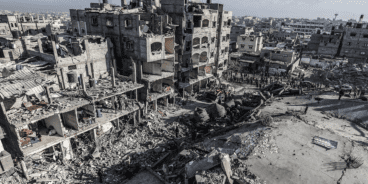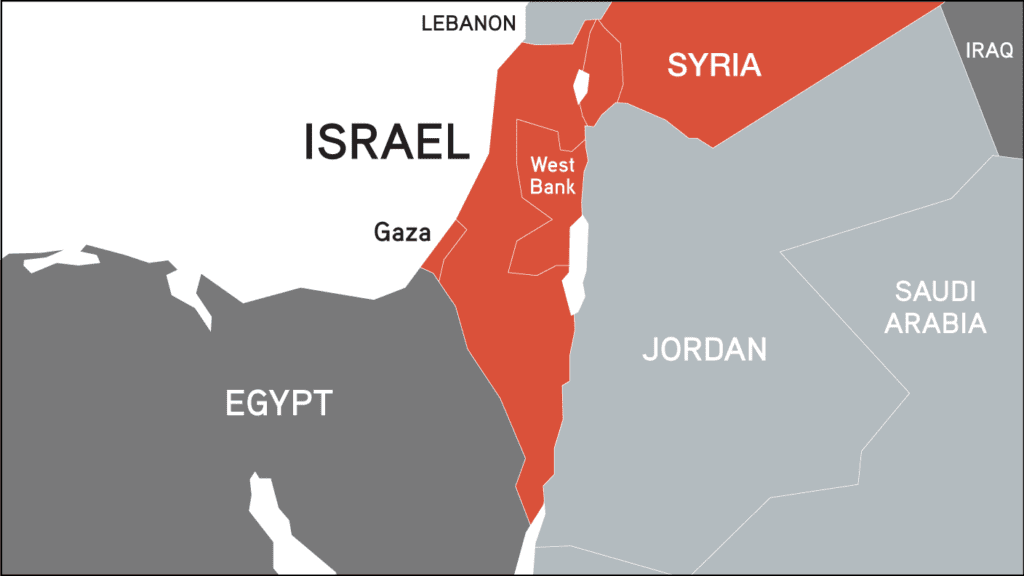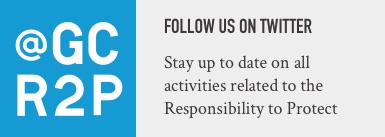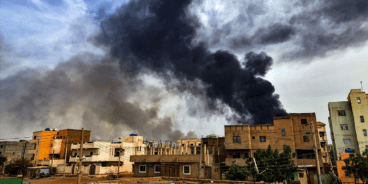
Israel and the Occupied Palestinian Territory
Since 7 October 2023 Israeli forces have perpetrated likely war crimes and crimes against humanity in Gaza and the Occupied West Bank. Palestinians face mounting risks of ethnic cleansing and genocide. Hamas and other Palestinian armed groups have also perpetrated likely atrocity crimes.
BACKGROUND:
On 7 October Hamas and other Palestinian armed groups launched a deadly assault into Israel. Militants attacked civilian areas and perpetrated flagrant violations of international law, including capturing and forcibly taking hundreds of civilians as hostages. At least 1,200 Israelis were killed, including 36 children, and over 5,400 injured. Hamas and other armed groups also continuously fired indiscriminate rockets toward Israel.
Following the attacks, Israel launched relentless bombardments from air, land and sea across the Gaza Strip, targeting and destroying civilian objects protected under International Humanitarian Law (IHL) in a manner widely characterized as collective punishment. Air raids have targeted residential buildings, hospitals, mosques, water and sanitation facilities, telecommunications towers, bakeries, schools and refugee and displacement camps. Since 7 October at least 30,000 Palestinians have been killed, approximately 70 percent of whom are women and children. Several hospitals have been raided by the Israeli military and reportedly forcefully evacuated. Israeli ground operations since 28 October have severed areas north of Wadi Gaza from the south.
On 9 October Israel imposed a complete siege of Gaza, resulting in acute shortages of water, food and medicines that threatened the survival of 2.3 million Palestinians and created a dire humanitarian crisis. On 11 October Israel cut off the electricity supply to Gaza, resulting in an ongoing blackout and contributing to the collapse of hospitals and water and sanitation services. Approximately 1.7 million Palestinians are currently internally displaced in Gaza. A group of UN Special Procedures have issued multiple warnings regarding a risk of genocide against the Palestinian people in light of dehumanizing statements made by Israeli officials and the accompanying bombardments and imposition of a total siege, while the Special Rapporteur on the situation of human rights in the Occupied Palestinian Territory (OPT) warned on 14 October that Palestinians in Gaza are in grave danger of ethnic cleansing.
Palestinian territory – encompassing the Gaza Strip and West Bank, including East Jerusalem – has been occupied by Israel since 1967. Various UN officials and investigative mechanisms have reaffirmed that Israel’s permanent occupation of Palestinian territory has no legal validity and has resulted in de facto annexation, which may amount to a war crime. The occupation has been characterized by the perpetual expansion of Israeli settlements into Palestinian territory with the aim of altering its ethnic demographics. The Israeli government has established a two-tiered legal and political system that provides comprehensive rights for Jewish Israeli settlers while imposing military rule and control on Palestinians without any basic protections or rights under international law. In March 2022 the UN Special Rapporteur on the situation of human rights in the OPT reported that this system satisfies the prevailing evidentiary standard for the crime of apartheid, a crime against humanity.
Palestinians are regularly subjected to violence by Israeli settlers, including physical attacks, shooting with live ammunition, torching of fields and livestock, theft and vandalization of property. According to the UN Office for the Coordination of Humanitarian Affairs, 2023 was the deadliest year in the Occupied West Bank, including East Jerusalem, since the UN began documenting casualties in 2005, with over 200 Palestinians and nearly 30 Israelis killed between January and September. Since 7 October, there has been a sharp increase in unnecessary and disproportionate force by Israeli forces – including airstrikes, violent military tactics during search-and-arrest operations, and incursions by armored personnel carriers and bulldozers sent to refugee camps – resulting in over 365 Palestinians killed and at least 4,288 injured in the Occupied West Bank. Israeli forces have also conducted daily mass arrests, with thousands of Palestinians arrested, as well as denied medical assistance to those injured in attacks. The Office of the UN High Commissioner for Human Rights (OHCHR) has reported numerous incidents of alleged torture and other ill-treatment against Palestinian detainees. Settler violence has also escalated, with Palestinians facing an average of four attacks per day. Israeli settlers have killed eight Palestinians and injured 114, while over 1,200 have been displaced. OHCHR has reported that settlers carrying out these attacks are at times acting with the acquiescence and collaboration of Israeli forces and authorities. Five Israelis have also been killed in attacks by armed Palestinians.
RECENT DEVELOPMENTS:
A humanitarian pause between Israel and Hamas lasted from 24 November – 1 December. The pause facilitated the delivery of life-saving aid and the release of dozens of Israeli and foreign hostages that had been held captive in Gaza since 7 October, as well as the release of dozens of Palestinians held in Israeli jails. Since then, Israeli military operations have expanded into southern Gaza, an area to which 1.1 million Palestinians from northern Gaza were previously forced to evacuate. Intense fighting around Khan Younis – including significant destruction to residential blocks and towers – as well as ongoing evacuation orders, continue to drive thousands of people into Rafah governorate, which is already hosting over half of Gaza’s population. Those internally displaced are living in makeshift structures, tents or out in the open without basic necessities to survive. In early February airstrikes and bombardments in Rafah increased. Other areas across middle and southern Gaza – where internally displaced Palestinians were directed to seek safety following the Israeli military’s evacuation orders – were also hit by airstrikes and missiles.
Since the resumption of hostilities, the humanitarian catastrophe has worsened with an imminent risk of famine and few remaining operational hospitals in Gaza. Approximately 300,000 Palestinians in northern Gaza are cut off from all humanitarian assistance.
On 6 December UN Secretary-General António Guterres invoked Article 99, urging the UN Security Council (UNSC) to help avert a humanitarian catastrophe in Gaza. In the weeks leading up to and following this, several draft resolutions failed to pass in the UNSC either due to insufficient votes or vetoes cast. On 22 December the UNSC passed a resolution requesting the Secretary-General appoint a Senior Humanitarian and Reconstruction Coordinator for Gaza that would establish a UN mechanism for accelerating the provision of humanitarian relief consignments. During an Emergency Special Session on 12 December, the UN General Assembly passed a resolution calling for an immediate humanitarian ceasefire with 153 votes in favor.
On 29 December South Africa filed an application before the International Court of Justice (ICJ) instituting proceedings concerning alleged violations of Israel’s obligations under the Convention on the Prevention and Punishment of the Crime of Genocide in relation to Palestinians in Gaza. The ICJ issued legally binding provisional measures on 26 January which ordered Israel to take all measures to prevent the commission of all acts within Article II of the Genocide Convention, to ensure that Israeli military forces do not commit any of these acts, to take measures to prevent and punish direct and public incitement to commit genocide against Palestinians, and to provide basic services, including humanitarian aid, to address adverse conditions of life in Gaza.
ANALYSIS:
During their attack on Israel, Hamas and other Palestinian armed groups perpetrated likely war crimes, as well as potential crimes against humanity. Hamas’ indiscriminate rocket attacks are also in violation of international law. Israel’s disproportionate attacks on civilians and civilian objects likely amount to war crimes, while the mass displacement of Palestinians in Gaza likely amounts to the war crime and crime against humanity of forcible transfer. Ongoing forced displacement and likely forcible transfer of Palestinian populations across Gaza increase risks of ethnic cleansing and genocide against Palestinians. Ongoing mass displacement and the spread of hostilities southwards, paired with statements by high-level Israeli officials, have increased fears of a risk of mass deportation of Palestinians to Egypt.
The imposition of sieges that deprive civilians of goods essential to their survival as a punitive measure may amount to collective punishment, a violation of IHL. While Israel has imposed an air, sea and land blockade of Gaza since 2007, the latest siege likely amounts to intentional starvation of civilians as a method of warfare – a war crime – and may amount to a crime against humanity. The intentional starvation of civilians in Gaza, together with recent statements from Israeli officials, may amount to a constitutive act of genocide – namely deliberately inflicting on a protected group conditions of life calculated to bring about its physical destruction in whole or in part. The recent decisions of several states to suspend funding to the UN Relief and Works Agency for Palestine Refugees in the Near East (UNRWA) – the largest humanitarian organization in Gaza providing critical life-saving services – will have catastrophic humanitarian consequences for the people of Gaza.
There has been no effective accountability for successive cycles of deadly hostilities between Israel and Hamas and other Palestinian armed groups over the past two decades, reinforcing a climate of impunity and enabling environment for further war crimes.
Since its formation in 1987, Hamas has consistently refused to recognize the State of Israel and has at times proliferated inflammatory and hateful rhetoric against Israelis and Jews. Hamas’ security forces have also committed grave abuses against Palestinians in Gaza, including arbitrary arrests, summary executions and torture. Any use of human shields by Hamas in the context of the current hostilities may amount to a war crime.
Article 49 of the Fourth Geneva Convention prohibits an occupying power from transferring parts of its civilian population into occupied territory, also known as “settler implantation.” Seizures and demolitions of Palestinian and Bedouin land and property leave communities at risk of forced evictions, arbitrary displacement and forcible transfer. Israel’s permanent occupation endangers the cultural existence of the Palestinian people and violates their right to self-determination.
RISK ASSESSMENT:
-
- Ongoing bombardments, ground offensives and siege tactics amounting to likely war crimes and crimes against humanity, as well as ongoing evacuation orders likely amount to crimes of forced displacement and forcible transfer, increasing risks of ethnic cleansing and genocide.
- Violence, attacks, mass arrests and likely forcible transfer in the Occupied West Bank.
- Institutionalized systematic racial oppression and discrimination against Palestinians amidst perpetual occupation amounting to de facto and illegal annexation of Palestinian land.
- Impunity for past likely atrocities perpetrated by Israeli security forces and Palestinian armed groups.
- Dehumanizing hate speech and incitement to violence between groups.
NECESSARY ACTION:
All likely war crimes and crimes against humanity must halt immediately. Hamas and other Palestinian armed groups must safely and unconditionally release all individuals taken hostage. Israel should immediately lift the siege of Gaza to allow the flow of critical supplies and ensure safe and unimpeded access for the delivery of humanitarian aid. A permanent ceasefire must be urgently reached and monitored by an independent, international body. All parties should condemn anti-Semitic, anti-Arab and Islamophobic hate speech and leaders must refrain from spreading and engaging in dehumanizing rhetoric and actions. States that have suspended funding to UNRWA should urgently restore their financial support.
Israel must immediately implement the ICJ’s provisional measures order and its allies must ensure Israel’s compliance. States parties to the Genocide Convention should support proceedings before the ICJ and refrain from attempts to impede the independent work of the Court or discredit the merits of the dispute. The international community should impose accountability measures for all previous and ongoing violations of international law in Israel and the OPT to end the cycle of impunity. The International Criminal Court (ICC) should accelerate its investigation into likely war crimes and crimes against humanity under its jurisdiction both before and during the latest hostilities. Israel should ratify the Rome Statute of the ICC and cooperate with all UN-mandated investigative mechanisms.
The root causes of violence and atrocities must also be addressed. Israel must lift its blockade on Gaza and cease illegal settlement-related activity and apartheid policies. It should also end the occupation of Palestinian territory and collective punishment of Palestinians. All parties should work toward a sustainable political solution consistent with international law and various UNSC resolutions.
Related Content

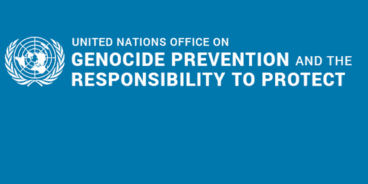
Statement by Ms. Alice Wairimu Nderitu, Special Adviser on the Prevention of Genocide, on the situation in the Middle East
